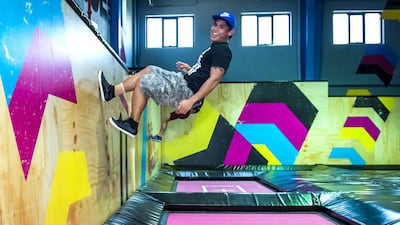An activity that is guaranteed to put a spring in your step this summer is wallrunning at Bounce, the Dubai trampoline studio, under the watchful eye of trainers such as champion trampolinist Cris Manero.
You’ll need to be a confident jumper to try wallrunning in the first place – so take a beginner’s class to perfect your back-drops. The running element is introduced next and you’ll bounce from your back onto a wall perpendicular to the trampoline. Once you’ve mastered your wallrun, ramp things up a notch with 360 wall-spins and other skilled moves such as the 180 UFO and 180 Rewind.
The intermediate classes take things to a higher level, with aerial wall acrobatics, including handstands and somersaults.
With schools out for summer, wallrunning could be the thing to keep your kids entertained (minimum height is 125 centimetres). Bounce has a Summer Tramp Camp for children between the ages 6 and 14, daily from 8.45am to noon until September 2. Sessions include trampoline training, contests and plenty of free bounce time.
• Wallrunning classes last three hours and cost Dh360. Bounce is located at 32, 4B, Al Quoz, Dubai. Visit www.bounce.ae, call 04 321 1400 or email info@bounce.ae for more information
rduane@thenational.ae

